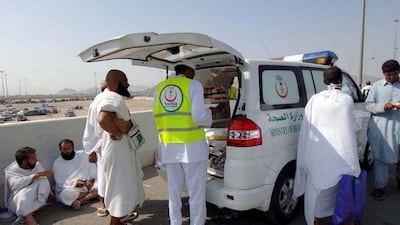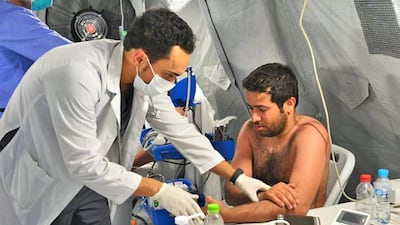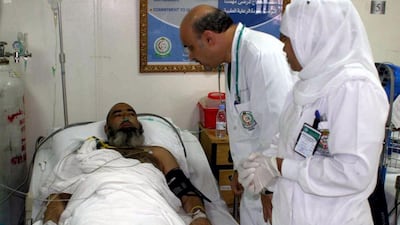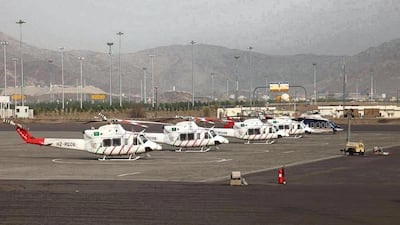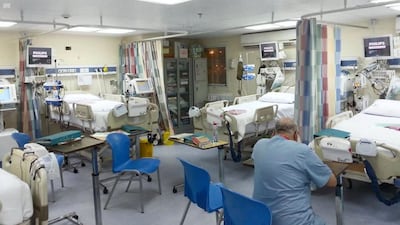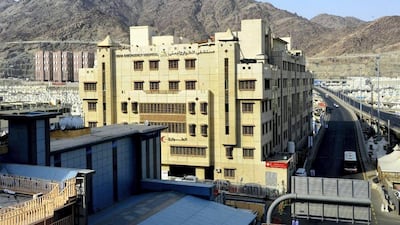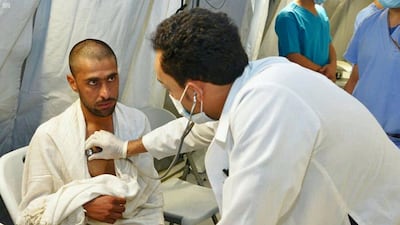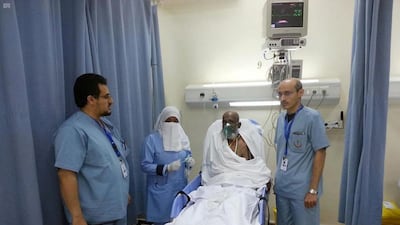Pilgrims arriving at the holy sites in Makkah will have a unique experience of the Hajj this year.
Places that are usually crowded with people are almost empty and those who do attend must maintain strict social distancing in line with regulations to prevent the spread of Covid-19.
Protocols introduced this year were outlined to The National by Hamed Al Atebi, an official from the Makkah Health Authority.
Mr Al Atebi said this year's plan was divided into three phases: the days leading up to the ritual on Wednesday, the pilgrims' journey and the period after Hajj.
On an ordinary year, the Hajj draws up to three million visitors but this year the number of pilgrims has been capped to under 10,000 Saudi residents, to contain the outbreak.
“All those selected for this year’s Hajj have no underlying health conditions, are between the ages of 20 and 60, and all tested negative for Covid-19," Mr Al Atebi said.
During the pre-Hajj phase of the plan, pilgrims were quarantined in their homes.
On arrival in Makkah on the fourth day of Dhu Al Hijja, they were screened and remained in isolation in a hotel until the start of their Hajj journey today.
Electronic bracelets were distributed on arrival to ensure isolation was maintained.
“Every single person working in Hajj who will be in direct contact with the pilgrims, such as the health leaders, are in isolation for these days,” Mr Al Atebi said.
During last year’s Hajj, health workers were posted at eight hospitals and 93 clinics in the holy sites around Makkah.
During the five or six-day period of the Hajj, hospitals will be fully prepared to cater for the pilgrims.
There will be mobile clinics, which act as full-service health centres, and mobile hospitals with intensive-care beds.
“These mobile hospitals will accompany the pilgrims during the performance of the rituals as they move from Mina, Arafat and Muzdalifah then back to Mina," Mr Al Atebi said.
This year’s pilgrims were instructed on the guidelines for Hajj 2020 during a health awareness session over Zoom on Sunday.
Each group will be assigned a health leader to accompany them round the clock to assist with health needs and ensure pilgrims are aware of the precautions and regulations in place.
Medical equipment has been placed in accommodations and thermal cameras and triage teams are ready at every point of arrival throughout the journey.
If a pilgrim shows symptoms of Covid-19, they will immediately be isolated to ensure the rest of the group can continue safely.
One of the most important parts of the ritual is Waqfat Arafat, which takes place on Thursday, in which the pilgrim must stay at the holy site from dawn to sunset.
If a pilgrim misses this, their Hajj is not recognised.
“We prepared the seasonal hospital in Arafat only for confirmed Covid-19 cases, to be able to facilitate their Hajj,” Mr Al Atebi said.
Groups will enter the holy sites at different times to ensure social distancing can be maintained.
They will be urged to wash their hands regularly throughout and masks must be worn at all times.
At the end of the Hajj, the pilgrims will go into isolation for seven days before returning to their homes across Saudi Arabia.
